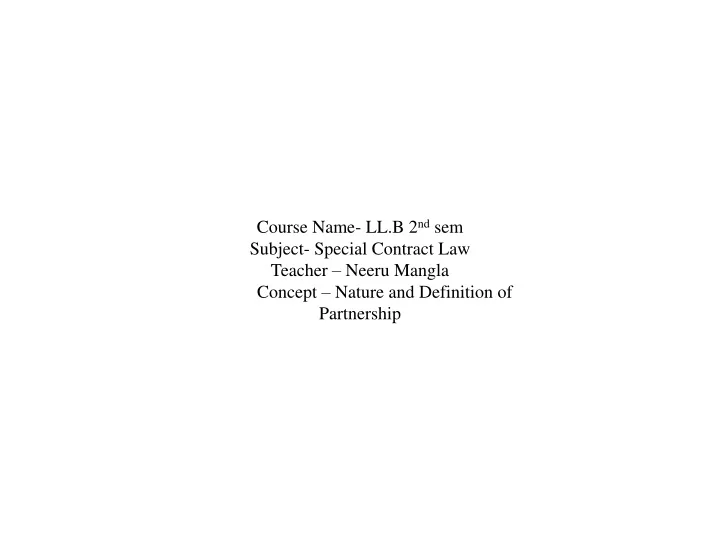

Course Name- LL.B 2 nd sem Subject- Special Contract Law Teacher – Neeru Mangla Concept – Nature and Definition of Partnership
Partnership • Introduction The Indian Partnership Act, 1932 defines a partnership as a relationship between two or more individuals who agree to share the profits of a business run by them all or by one or more individuals acting for them all. Individuals who have entered into a partnership with each other are called “partners” and collectively a “company,” and the name under which their business is carried on is called the “company name. ” Example • X and Y purchase 100 bales of cotton that they agree to sell on their shared account. For the sale of such cotton, X and Y are partners. X and Y purchase 100 bales of cotton and agree to share. X and Y are not partners. • X agrees with Y, a goldsmith, to purchase and furnish gold to Y, to be processed, sold and to share the profit or losses that result. X and Y are partners
Background of Indian Partnership Act,1932 • The Indian Partnership Act, 1932 came into effect on the 1st day of October 1932 and was passed in 1931. This Act replaces the previous Indian Contract Act, Chapter XI, 1872. • It’s not comprehensive legislation. It is aimed at defining and amending the law of partnership. A partnership arises from a contract and thus the partnership agreement is not only governed by the provisions of The Indian Partnership Act, 1932 in that context, but also by general contract law in cases where no specific provision is made under The Indian Partnership Act, 1932. The Indian Partnership Act, 1932 expressly provides that unrevealed provisions of the Indian Contract Act, 1872, remain in force except in cases where it is inconsistent with express provisions under this Act. The provisions of the Indian Contract Act also apply for a partnership contract, hence the provisions on offer and acceptance, consideration, free agreement, legality, etc. On the other hand, the minor’s position is governed by the provisions of The Indian Partnership Act, 1932, a special provision is contained in Section 30 of the Indian Partnership Act, 1932.
Scope of Indian Partnership Act, 1932 • The scope of a partnership is primarily a matter of partners’ intentions. The application of the powers it chooses to exercise at any time is not restricted except prohibition on illegal, immoral or fraudulent behavior that applies equally to individuals. • If consent is given by the constituent company’s partners, a partner may itself be a member of another company. • If the contract appears to be authorized or ratified by all partners, there usually is no further question as to its validity
Essential elements of a partnership Association of two or more person • To form a partnership, there must be at least two people. All partners must be contractually competent. Therefore, the company is said to be dissolved if the number of partners in a company is reduced to one. • There are no limitations on the maximum number of companies in The Indian Partnership Act, 1932. Nevertheless, the Indian Companies Act 2013 establishes a limit on the number of partners in a company as follows: • For banking business, partners must be less than equal to 10. • For any other enterprise, partners must be less than equal to 20. • The partnership becomes illegal if the number of partners exceeds the limit
Agreement among the Partners • Section 5 of The Indian Partnership Act, 1932 states that “The partnership does not arise from the status of the law or the operation of the law but is the result of the agreement” . • The partnership is established by an agreement between two or several persons, i.e. a partnership agreement. An agreement may be either express (oral or written) or implied. Therefore, a partnership does not exist by status but by agreement. Rights and Duties of partners are defined as per agreement.
Existence of Business Activity The business has to be ongoing and legally binding. The partnership’s main motto is to operate and make profits. Partnerships are therefore not considered for people who work together for social or charitable work
Sharing of Profits • The main goal of a company is to earn a profit. These profits are shared in a pre-decided ratio among the partners. • If a person is not entitled to share income, he cannot be called a partner. But a partner is not liable according to an agreement to share the losses
Mutual Agency • Relations with a mutual agency means that all or any partner must conduct a company’s business. A partner is an agent of the other partner and can thus bind another partner through his act. A partner is also principally responsible for the actions of the other partners of the company
Recommend
More recommend